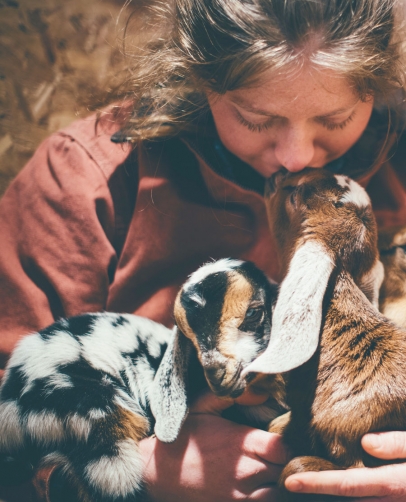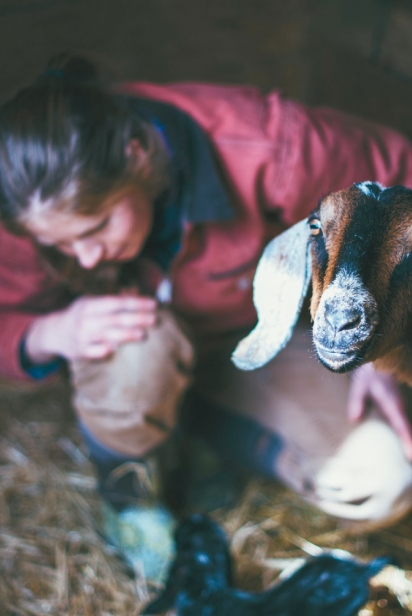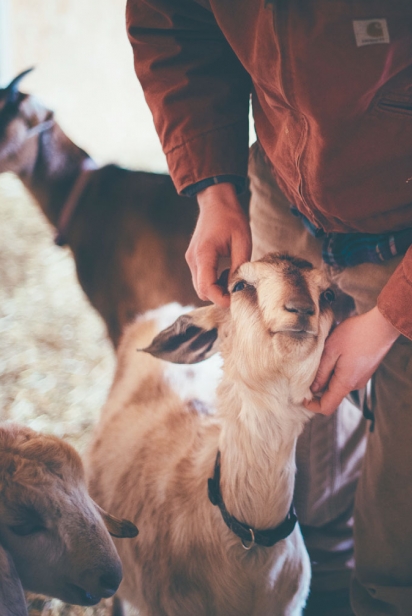The Year of the Goat: Sustainable Farming, Teton Valley Style
The early spring wind stroked my face as I stepped out of the car in “Drictor” (the region of Teton Valley that lies between Driggs and Victor) and onto Winter Winds Farm. I peeked around one of the two outbuildings and was greeted by a herd of 18 curious faces: Nubian goats, a breed known for their long, floppy ears and the high butterfat content of their milk. I quickly chatted them up before seeking out Winter Winds owners Ginny Robbins and Nathan Ray, a chef by trade, who explained how he got into the biz.
“I wanted to be part of the community … and bring back the skill of cheesemaking,” said Ray. “Like in any industry, the artisanal little guy is coming back.”
And that’s an understatement. Goat dairies are popping up like weeds in the Teton Valley, second only to backyard chickens. Each year, a new purveyor peddles their prized chèvres and aged goat cheeses at local farmers markets. Winter Winds, for example, sells fresh chèvre and crottin, a surface-ripened goat cheese similar to brie.
But goat farming isn’t just about the cheese. Raising these versatile creatures offers a low-maintenance way to farm, one that makes a sustainable livelihood much more feasible. “I was a one-girl operation and could manhandle them easier than a cow,” said Marianne Sturken Vanderpool of Teton Goats, while milking Momma, one of her oldest producers.
Dairy goats are about one-sixth the size of a cow and much easier to milk. They are steady producers with longer productive lives than their counterparts. Also, it takes less feed for a goat to produce one gallon of milk than it does for a cow to produce the same.
Vanderpool hand-milks most of her goats for a daily yield of approximately six creamy gallons from five animals—enough to produce and sell goat milk, several types of chèvre, feta and handmade goat-milk soaps.
Goats are also hardy creatures, making them a good choice for the Idaho landscape. Vanderpool’s goats are a mix of Saanen, Alpine and Nubian breeds. Saanens rank high in production, Alpines are suited to cold climates and high altitudes, and Nubians provide the dual purpose of meat and milk.
Both Winter Winds Farm and Teton Goats operate a closed-loop system by composting goat manure and spreading it onto their fields. “My interpretation of sustainability is using my farm byproducts in production,” said Vanderpool. She and her husband, Ty, also hay their neighboring acreage, selling fertilizer-free hay to fellow farmers. And both farms gift their whey (the byproduct of cheesemaking) to local pig farmers. Ray loves the sweet, nutty flavor of whey-raised pigs and hopes to someday expand his farm to raise them.
In addition to producing milk, goats also make good weeders. Goat Mountain Ranch in Ashton provides a prescriptive grazing service for land that needs noxious weed or fire mitigation. Goats are efficient browsers that select a high-quality diet from low-quality forages.
“The mothers teach their young how to eat invasive weeds, as they have much more protein than grasses,” said owner Mark Harbaugh.
Derek Ellis, of Ellis Custom Meats in Victor, butchers goats for locals. He says the meat has a similar taste to lamb. Harbaugh agrees, describing the flavor as somewhere between elk and lamb. He says you can prepare it as you would any other red meat—pan-seared, barbecued or roasted. “If I had the time, I think goat sausage would crush it nationally,” Ellis added.
Ray and Robbins of Winter Winds Farm slaughter most of their bucks for meat, trading it for fresh veggies and eggs. “I hate gardening,” Robbins confessed. “Raising goats is a way to be involved in my own food production without having to garden.”
This year, Winter Winds Farm will expand their milking operation with USDA certification. This will allow them to distribute their products out of state, putting them closer towards their goal of financial security via farm life.
Goat farms like these are thriving in mindful communities across the country. And these multi-use animals, with their quirky personalities and delectable yields, continue to help new farmers foster a sustainable, low-maintenance living from the land.
Winter Winds Farm
375 W. 4000 S., Victor, ID 83455
208.243.5151 • WinterWindsFarm.com
Teton Goats
PO Box 771, Victor ID 83455
208.709.1574 • TetonGoats.com







